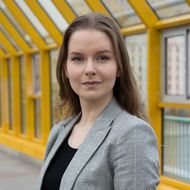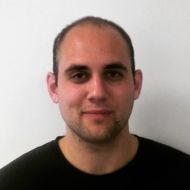Skills for a Wide Range of Tasks: Admissions Now Open for Online Master of Data Science Programme

The Master of Data Science (MDS) programme launched by HSE University in 2020 is the first and only online master’s programme on Coursera in Russia. The latest admissions campaign for the programme has now begun. Second-year students Vasilina Denyakina and Valery Sedin spoke to the HSE News Service about how the latest theoretical and practical knowledge with a focus on solving real industry problems helps train sought-after professionals. They also talked about the wide variety of data science research topics.

Vasilina Denyakina
Why did you choose HSE University when applying for your Master’s in Data Science?
When choosing my future specialization, I wanted to learn to make effective decisions that were based on data. The MDS programme at HSE University was appealing for several reasons. First, students learn about programming and algorithms from scratch. This was a big advantage over the programmes offered by other universities, as my bachelor’s degree was in a different field and it otherwise would have taken a long time to prepare my application. The second reason was that the programme is fully online, which was particularly relevant during the pandemic. The timetable is also quite flexible. The third reason was the language—all my classes at ICEF were in English, and there are a lot of mathematical terms I find easier to understand in that language.
Does the programme have a good balance of theory and practice?
Despite the practice-oriented nature of the programme, there is still plenty of room for theory. All of the theoretical courses are useful, provide a good foundation and build up your understanding. If you need to dive deeper into a topic, an understanding of the basics makes it much easier for you to learn more about it yourself. Theory also helps solve practical tasks, as you can use it to build hypotheses when you don’t know which approach to take.
I would like to single out the courses in Statistics and Combinatorics. These subjects are taught in a very accessible way
One of the first courses on the programme, Combinatorics, was something that I’d struggled with since school, and I’d given up hope of understanding it. But then, something amazing happened! The programme is suitable for humanities students, because our studies really do start with the fundamentals. The time it takes to get to grips with the material depends on your background—it’s just a matter of how much effort you put into it.
The core subjects such as Machine Learning and Deep Learning are sufficiently practice-oriented and diverse in terms of tasks. The opportunity to solve a wide range of tasks in different fields is an advantage. I try to apply new knowledge to work right away. I hope to take my current projects to a new level in the near future thanks to the experience I’ve gained here.
Which of the programme’s practical projects did you find most interesting and useful?
I liked the deep-learning project where we had to create a neural network to generate captions for pictures. It wasn’t just informative in terms of learning the subject, but it was also fun. At first glance, it didn’t seem like it would be useful, but in the end, part of the architecture of the network formed a basis for working code.
Are there any good employers in Russia who are interested in hiring data science specialists?
Yes, in all kinds of fields—from giants like Yandex to small but steadily developing start-ups. I think that in the future, data science specialists will be in high demand in most industries.
The master’s programme is also useful to people who want to work in a different subject area. In my opinion, mathematics and analytical thinking skills are always beneficial. The amount of data around us is growing all the time, and the ability to work with it is an asset to anyone. The MDS programme provides the skills necessary for this.
Data science is evolving every day. This is evident from the number of scientific articles published and the new technologies that are becoming part of our everyday lives: natural language processing, computer vision, drones and much more. But the mainstream areas are perhaps still AI and neural networks.
What did you find most difficult about the learning process?
For a long time, the biggest difficulty was maintaining a work-life balance. I’m a perfectionist, so it wasn’t easy to get everything done at work, then switch over to studying and immerse myself in subjects that were, for the most part, completely new to me. Now I’m trying to take a simpler approach to everything.
Did the online format of the programme allow you to socialise and get involved in the study process?
There’s definitely no lack of communication between students. We have multiple ways of keeping in touch: email, Slack, the Coursera forums, and less-formal chats in Telegram. Some of my coursemates who live in Moscow organised a couple of in-person meet-ups. And if the pandemic situation allows it, the Programme Office is going to invite our overseas coursemates to Russia for our graduation.

Valery Sedin
Why did you decide to pursue Data Science?
Data science is the future. Specialists in this field will change the world (and make it better, I hope!).
How did you end up devoting your master’s thesis to an analysis of women’s football?
HSE University is home to the nationally famous Laboratory of Sports Studies. When I enrolled, I never would have dreamed that I would get the chance to work with its head, Dmitry Dagaev, to write the work ‘Evaluating Performance in Women’s Soccer: A Machine Learning Approach.’
Read interviews with the first intake of students for the MDS programme here.
The choice of this topic in particular comes from a desire to conduct research that genuinely contributes something new to the field of sports science. Women’s football has been researched to a much lesser degree than men’s football, which means that there are more new discoveries to be made there. There is not a lot of suitable, publicly available data, so I mostly looked at European football.
How was the analytical work structured?
I used public data from the StatsBomb database of men’s and women’s tournaments. The database contains information on every action involving the ball in every match of every available tournament. We compared the effectiveness of these actions between women and men. The model is a fairly simple neural network. It was trained using a full batch of training data and data on women’s tournaments. The model can also be expanded to cover men’s football.
Can you use your master’s thesis in your professional activities?
My work concerns questions of energy efficiency, and there’s no question that data science skills will be useful to me. Of course, I would like to be able to apply the results of my thesis work in practice, but it largely depends on how good the model ends up being. At the moment, my academic supervisor and I are working to interpret the results.

Dmitry Borisov
‘The amount of data in companies is growing rapidly, and solutions based on data are used to create effective business strategies,’ explains Dmitry Borisov, teacher of the online Python Advanced course of the MDS programme. ‘There is increasing demand in the market for people who can conduct full-cycle work with data: collection and logging, pre-processing and analysis, and the creation of predictive models. In order to make sure that graduates of the programme have the necessary skillset to work with data, many of the courses of the master’s programme (including ours) are based on practical work. There are lots of tasks to solve, and each of them has unique solutions that are shared after the students submit their work. This provides the students with good templates and methods to improve their own solutions. During the course, students also have to deal with two complex tasks with a comprehensive review from the teacher. Students who complete these tasks deserve to feel proud of themselves.’

